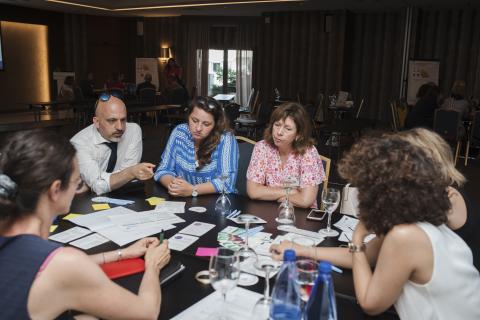Building a support system for participation in EU funded programmes
On 29-30 June 2022, the Policy Learning Platform held a peer review for the Marshal’s office of Pomorskie Voivodeship. You can now access the report of this event which features policy recommendations.
The Pomorskie Voivodeship wished to learn from other experiences across the EU in the field of supporting local organisations in accessing knowledge and funds to accelerate innovation projects in the region.
- Which governance structures can be most efficient for supporting local SMEs, larger companies, and research institutions in their search for funding?
- What services can a regional authority provide to its local stakeholders?
- How can the success of the implemented actions be measured in the short and long term?
Peers from across Europe
Alongside Marc Pattinson and Thorsten Kohlisch, our thematic experts, five excellent peers participated in the peer review:
- Wim de Kinderen, Brainport Eindhoven EU Office (The Netherlands)
- Laetitia Turlutte, Hauts de France Region (France)
- Mieszek Jagiello and Lars Wirbatz, Brandenburgian Ministry of Finance and for European Affairs (Germany)
- Alexandra Vilela, COMPETE2020 Programme (Portugal)
The experts came together to share their experience and to provide recommendations for ways of tackling Pomorskie’s challenges.
They provided the host with valuable insight, know-how, and practical suggestions for solving the challenges presented above.
Some recommendations
One of the crucial elements to take into account is the alignment of the policy frameworks. The EU-funded policies in the region should be coherent with the priorities set across all areas of regional competence, e.g. the S3 strategy.
The peers also highlighted the importance of setting up an efficient governance structure, where the Region appoints a coordinator to steer and animate the local ecosystem of companies and research institutions.
The role of intermediaries should not be neglected, they are actually a real strength in the animation of the territory. Clusters can be, for instance, key drivers: the Region could test several instruments and financing mechanisms with them, such as innovation vouchers.
Reviewing the financial support framework is one of the first steps to take.
Consider a diversification of the policy mix, with ERDF funding coupled with pre-financing mechanisms, or cascade funding. ERDF can be used to enhance the Seal of Excellence initiatives or new schemes for innovation support (vouchers).
Removing barriers to access such funding opportunities is a challenge to be taken up with priority.
The peers acknowledged the importance of establishing partnerships at the EU level, staying up to date, networking and seizing opportunities as they appear.
The Vanguard initiative, ERRIN, or other EU networks are arenas for meeting like-minded colleagues to learn from, and for positioning the Region in the EU context with significant visibility - which can make a difference and provide new opportunities for the development of local SMEs.
Two-way communication is of utmost importance. First of all, the regional government should be able to listen to the needs of SMEs and larger companies, in order to understand how to adjust the programmes ensuring coherence of action between policy and economic players.
Then, promotion and awareness-raising campaigns are helpful for companies to feel supported and to understand what the Region and EU funding can do for them. The peers provided several good practices that Pomorskie can take inspiration from.
These are only some of the recommendations provided by peers. The host’s policy challenges and all the detailed peer suggestions are described in the follow-up report.

Peer review
Do you also need advise to accelerate innovation projects in your region?
